[ad_1]
 Image by Ingo Jakubke
Image by Ingo Jakubke
When you book into a hotel your primary concerns are likely to be – how comfortable are the beds? Or what’s the view like? The fact that we rarely consider security is largely down to the fact that behind-the-scenes hotel staff and systems are working hard to ensure that your stay is safe and secure.
But just how do hotels ensure our safety? The answer is multifaceted and intricate, involving a blend of technology, trained personnel, and well-established protocols. Let’s have a look behind-the-scenes and see just how hotels make sure your stay is memorable for all the right reasons.
Technology: The Key to Hotel Security
Let’s begin by exploring the ever-expanding use of technology to enhance hotel security. Emerging technologies are offering huge advantages across the travel industry.
The use of technology in hotels has rapidly evolved from fairly basic systems to integrated multi-faceted systems that use the latest technologies and equipment to add layers of discrete security.
Among some of the common uses of technology in hotel security are:
- Security Cameras: Commercial security cameras can monitor entrances and exits, hallways, parking lots, and other common areas, providing a deterrent to potential criminal activity.
- Access Control Systems: Hotel door lock systems often use electronic key cards for room access, which not only provide a convenient way for guests to enter their rooms but also allow the hotel to track who enters and exits each room.
- Biometric Systems: Some high-end hotels have started implementing biometric systems for enhanced security. These systems may include fingerprint, facial recognition, or retina scanning technologies.
The use of technology not only bolsters the security of hotels but also helps streamline the guest experience, ensuring a stay that is both safe and comfortable.
Don’t Be Alarmed: An Alarm for Every Occasion
Seeing alarms mentioned in this context probably isn’t a surprise to anyone. The use of alarm systems in hotels is mandated by law in most countries. What may be more of a surprise is just how complex and clever modern alarm systems are.
- Fire Alarm Systems: These are perhaps the most common type of alarm system in hotels. They are designed to detect smoke or excessive heat and trigger an alarm. Modern systems can even pinpoint the exact location of the fire, aiding in swift response and evacuation.
- Intrusion Alarm Systems: These alarms are designed to detect unauthorized entry into restricted areas of the hotel. They can be linked to access control systems and can alert security personnel if someone attempts to access a restricted area.
- Gas Leak Alarms: These alarms are crucial in areas where gas-powered appliances are used, such as hotel kitchens.
- Emergency Alarm Buttons: Often found in public areas and staff-only sections of the hotel, these buttons can be pressed in case of any emergency, triggering an immediate response from hotel security or local emergency services.
Modern alarm systems are one of the main reasons we remain “unalarmed” during hotel stays.
Staff Training and Security Personnel: Adding the Human Touch to Hotel Security
It is easy in the age of automation and AI to overlook the human aspect of security in hotels. But ultimately, AI is not a human replacement, it is a tool that humans can use to enhance security. The “feet on the ground” human aspect should always be a core part of hotel security.
Here are a few of the ways that hotel personnel can add the human touch to hotel security.
- Regular Training: Hotel staff undergo regular training to handle a variety of emergencies, from fires to medical crises. This ensures that they are always prepared to respond swiftly and effectively when needed.
- Security Personnel: Many hotels employ security personnel who patrol the premises, especially during the night. They are trained to handle various situations, from disturbances to emergencies, and their presence adds a layer of security.
- Customer Service: Staff are often the first point of contact for guests and play a crucial role in ensuring their safety. They are trained to handle guest concerns and queries, provide safety information, and assist in emergencies.
Technology should always be considered a tool for enhancing human vigilance and efficiency in security measures, and not a replacement.
From Physical to Virtual: Let’s Not Forget the Data
Finally, let’s not forget the importance of data security. Discovering that your credit card has been compromised or your identity stolen is not conducive to a happy holiday or successful business trip!
Hotels use a range of measures to ensure your stay is “data-safe”. Here are a few of them:
- Secure Networks: Hotels use secure networks to protect guests’ personal and financial information.
- Payment Security: When guests make payments using their credit or debit cards, hotels use secure payment processing systems to protect this sensitive data.
- Cybersecurity Training: Hotel staff receive training on cybersecurity best practices, such as recognizing phishing attempts and securing their workstations.
Hotel security is no longer just about protecting guests and their belongings, it is also about protecting their digital privacy.
Checking Out: A Happy and Secure Stay
Security might not be the first thing that springs to mind when choosing the perfect travel destination, but the next time you check out of a hotel after a happy – and secure – stay, remember the intricate layers of security that made your stay a safe one. Hotels go to extraordinary lengths to make sure our primary concerns are the view from the window and the comfort of the bed.
[ad_2]
Source link
Jarastyle – #Hotels #Ensure #Safety
Courtesy : https://drifttravel.com/behind-the-scenes-how-hotels-ensure-your-safety/

